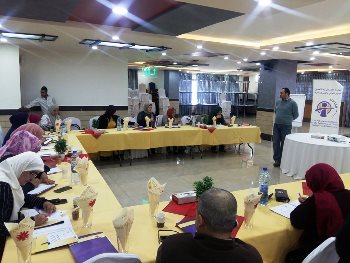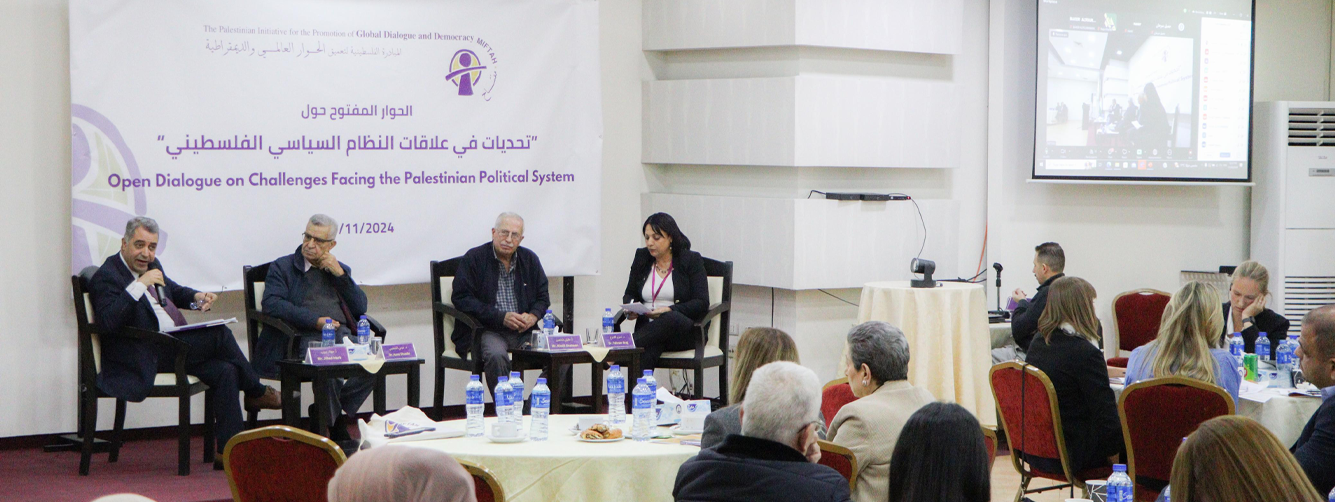
MIFTAH recently completed two discussion sessions in the southern and northern districts of the West Bank, with the participation of representative of several national factions, dozens of women activists and members of local councils. Recommendations from research studies conducted by MIFTAH were presented during the sessions on the available ways of making amendments to the electoral system in Palestine for promoting a climate of democracy and the peaceful transfer of power and which would expand the scope of women’s and youth participation.
MIFTAH project manager Hanan Said maintained that the discussion sessions sponsored by MIFTAH are part of its interventions within its project “Promoting political partnership of women in public life”, which is aimed at shedding light on the challenges of political participation for Palestinian women.
Said said the research paper highlighted the characteristics of the Palestinian electoral system, including legislative and local council elections, and the crucial stages of this system. It also sheds light on the ramifications and impacts this system has on the political participation of Palestinian women and youth in legislative and local elections. In addition, it highlights the legal gaps in the electoral law and the obstacles to local monitoring commissions and the media. The paper, she said, produced practical recommendations that could be implemented should there be political willingness for change, most significantly, shedding light on women and youth being in advanced positions on electoral lists.
Reflections on the discussions
The participants of the discussion session expressed their varying views on the presentations and the research paper. Director of the Ya’abad Women’s Center, Salam Abu Bakr said she would like to see more discussions on the paper by giving the participants more time to discuss other issues pertaining to the proposed amendments to the elections law and the scope and nature of women’s and youth participation in local and legislative elections. “In terms of the recommendations, I support open lists in any elections because it gives more of a chance for everyone to choose the candidates they believe are the most suitable. However, I reject the quota system like the one implemented in municipal elections. I believe this system is one of the main obstacles to women and youth reaching decision-making positions.”
Meanwhile, Dr. Raja’ Sargali, a women’s activist in Tulkarm, confirmed the need to lower the candidacy age for youths so they could be able to actively participate in decision-making. She said the current elections law is unjust towards this societal sector. “This will require that all civil society organizations and rights institutions exercise pressure towards changing part of the Basic Law and making amendments to the elections law. It also requires that factions adhere to what they signed on in terms of the percentage of women’s participation.” Sargali also said she supported open electoral lists.
Attorney Yazan Masri from Nablus called for nonstop action from civil society organizations and women’s and youth movements to pressure for the demanded amendments to the electoral system. He also showed support for lowing the candidacy age for youth and lowering the threshold from 8% to 5% in addition to opening opportunities for broader participation of youth in local and legislative elections.
Mohammed Bakri, National Office Secretary and representative of the national factions in the southern region, proposed the inclusion of other sectors of women in any future discussions on the elections law. He said discussions should not be limited to women from elite institutions but should take into consideration the viewpoints of women from other sectors of society and ordinary employees, in addition to having a larger youth representation in such discussions.
Bakri also proposed lowering the candidacy age in local elections to a minimum of 22 and to also determine the maximum age so it does not exceed, for example, 65. He called for raising awareness and knowledge on open and closed lists and the difference between the lists on women and youth, adding that this is the responsibility of the factions even though he said, “Our concept of ‘party’ is still immature given that we still believe in liberation and struggle movements. We do not have parties in the true sense of the word like in independent countries.”
MIFTAH is continuing the dialogue on supporting women’s and youth representation in the electoral system with participation from political leaders from the various factions, decision makers and civil society institutions.








